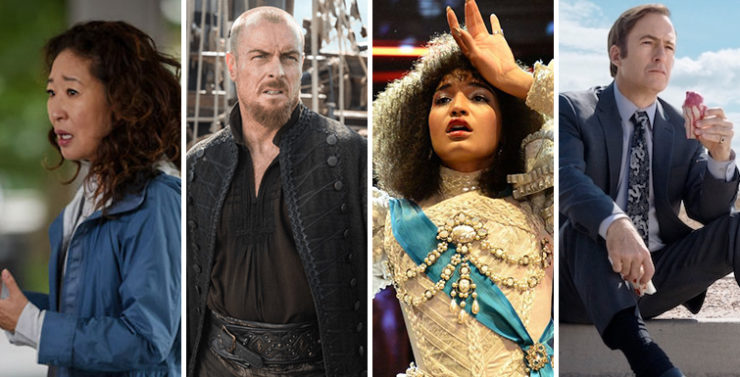It should come as no surprise that those of us at Tor.com are pretty heavily steeped in genre television, from decades-spanning classics Doctor Who and Star Trek or nostalgia favorites The X-Files and Battlestar Galactica, to modern epic Game of Thrones and experimental serial Black Mirror. But sometimes we like to put aside the monsters and the time travel for shows a little more grounded in reality. With that in mind, we wanted to share some of current non-SFF obsessions—let us know your picks in the comments!
Black Sails
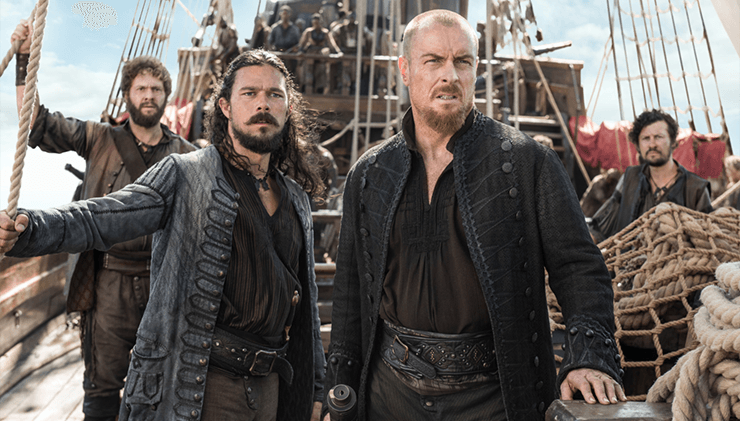
When the internet lets you know that there’s a television show about queer anti-colonialist pirates, starring some of the most beautiful humans on earth, you should probably get right on watching that show. Some people will hear the words “prequel to Treasure Island” and cringe, but don’t let it throw you off! Black Sails is its own story, with fictionalized versions of many real-life pirates (Blackbeard, Charles Vane, Ned Lowe and more), and a brand of storytelling that is rare in television; while a lot happens in the show, many of these sweeping plot machinations play second fiddle to minute character interactions and meticulous emotional buildup. It’s the kind of show you hold your breath watching. There are very few characters who don’t have both lovable and abhorrent traits, and you’ll find yourself changing your stance on most of them by the time the show is over (though trash baby Jack Rackham and murder bean Anne Bonny were favorites of mine start to finish). If you’re watching the reboot of Lost in Space, be prepared to see John Robinson in a completely different light; Toby Stephens stars as the infamous Captain Flint, and his ownership of the screen every second he’s on it is a masterclass in feelings—and how to destroy them.
Sidenote: Molly and I both watch this, and we disagree vehemently about John Silver. –Emily
UGH JOHN SILVER! Well, to be fair, the big difference between me and Emily on this show is that she’s finished it and I am draaaaaaaagging it out so it will last as long as possible. Everything she says is true (except precious protect-at-all-costs Max is my favorite-from-the-start), especially about how the show will make you change your opinion on just about everyone. I hated Charles Vane and now I love him. I couldn’t bear John Silver and he’s … getting better. This all happens because Black Sails has never met a character it couldn’t intensify and complicate—and because the show’s writers are absolutely brilliant at advancing character through action. When Eleanor frees Charles’s prisoner; when Charles rolls his eyes and goes to help Flint; when Silver finds that pretending to care about other people leads to actually really caring about them; when Max and Anne and Jack do a careful dance around each other’s secret soft hearts—these are the things that make this show so intensely good. —Molly
Killing Eve
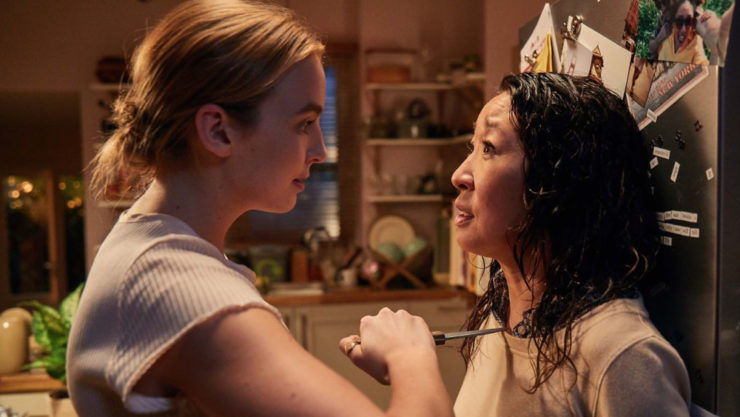
The downside of this era of Prestige TV is that the pilots can seem awfully formulaic, establishing The Brooding Antihero or The Asshole Genius amid grim title cards. So when the first two scenes of Phoebe Waller-Bridge’s Killing Eve introduced its diametrically-opposed leads in ways that I’ve almost never seen on television, I knew we were in for something special: Villanelle’s sociopathy is established in a perfect, nonverbal interaction with a child… and our first interaction with Eve is her screaming in agony because her arms fell asleep. It is rare that Prestige TV can make you laugh out loud. Eve is the Everywoman I didn’t know I needed, the neurotic, dowdy MI-5 agent who should be the absolute worst match for fabulous, sinister assassin Villanelle—but Eve is smart as hell, and dogged even in the face of dismissal from her superiors, and has such great hair, that you don’t know whether you want to be her or be with her. That’s the feeling sparking between these two, the charge that drives their compelling relationship.
Killing Eve makes the case for bringing in a new voice for a fresh take on material. Author Luke Jennings certainly created the world of the Codename Villanelle novellas, but I could never have imagined a dynamic quite so specific and captivating from a male showrunner. –Natalie
Alias Grace
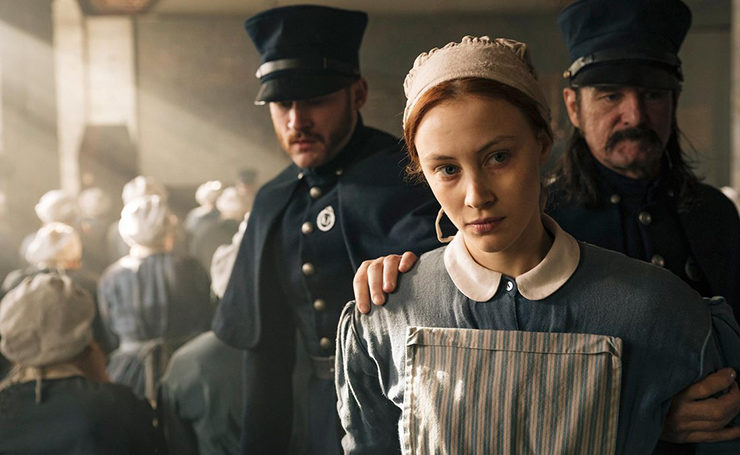
It’s been months since I watched Alias Grace on Netflix and I haven’t been able to stop thinking about it since. Like The Handmaid’s Tale, the series is based on a Margaret Atwood novel centered on the struggles and rebellion of women trapped in a political and patriarchal nightmare. Alias Grace is set not in the dystopic future but in the historical past, weaving a fictionalized account of the events surrounding two notorious real-life murders. Together, director Mary Harron and writer Sarah Polley, who adapted Atwood’s book, join forces to create a perfect, harrowing, morbidly fascinating story about agency, obsession, internalized misogyny, repression, voyeurism, and narrative control.
It’s an amazing achievement, spread out over six increasingly haunting hour-long episodes—without spoiling anything about the plot, I was very afraid heading into the last couple of episodes that the series would somehow fail to stick the landing, and couldn’t possibly come up with a satisfying conclusion to the mysteries and possible versions of reality that the titular Grace piles around herself and seems to discard or alter at whim—but the final episode did not disappoint, building on a million tiny details into a revelation about truth, perception, and the way the seemingly powerless survive by telling stories in a way the dominant culture wants to hear them, while keeping the truth alive, under the surface or shrewdly, painstakingly channeled into art.
(Also, if you’re into Canadian actors, this show not only provides a Slings and Arrows mini-reunion, but also David Cronenberg with amazing old-timey sideburns, so…worth watching for that alone, not to mention the masterful performance of Sarah Gadon as Grace.) –Bridget
Elementary
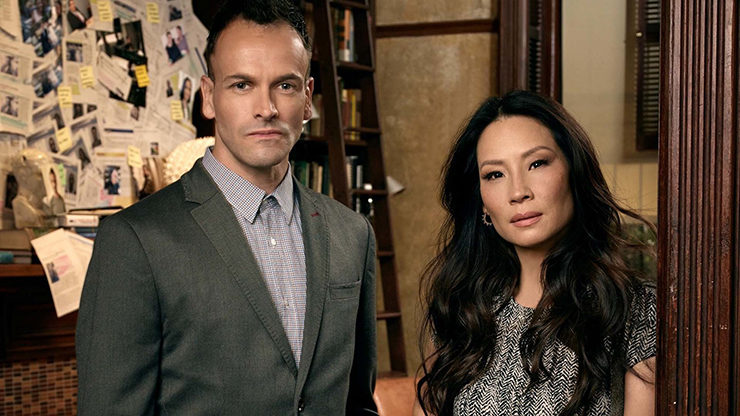
I’m usually a season behind on Elementary, but my reasons for loving this show have very little to do with the plotting and everything to do with Jonny Lee Miller’s Sherlock and Lucy Liu’s Watson. Who could’ve guessed, back in the ’90s, that Sickboy from Trainspotting and the perpetually underused Liu (Lucky Number Slevin, anyone?) would wind up such a perfectly matched Sherlock and Watson? Elementary uses an often by-the-numbers procedural structure as the foundation for a story that’s really about the ever-shifting partnership between these two: sober companion and addict, master and apprentice, skilled teammates, and, in the current season, close friends with a new challenge to face: Sherlock’s post-concussion syndrome, which has the brilliant, tireless, arrogant detective struggling with the most basic parts of his existence. I love the way these two work together; the way Sherlock is always surprised by what he learns from Watson; the show’s honesty about Sherlock’s addiction; and, to be totally honest, the evolution of Joan Watson’s style over the years, from enviable drapey cardigans to striking fitted suits. That’s a master class in costuming—in displaying a character’s growth and change in every item they wear—right there. –Molly
The Late Show with Stephen Colbert and Late Night with Seth Meyers
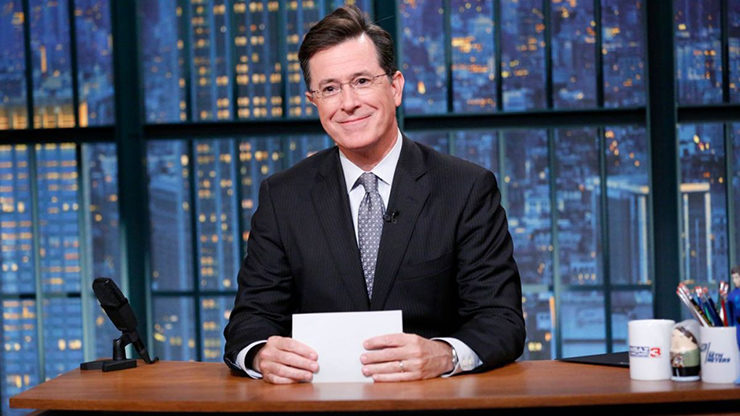
When we talked about this post, I realized that I haven’t actually watched much non-SFF lately. I keep meaning to. I keep saving stuff on my DVR. But somehow I never hit play on any of it—except for these two particular late night shows. It’s become a ritual, actually: I get home from work, hop on YouTube, cue clips up while I’m making dinner, and then work my way through The Late Show and Late Night while I eat. This serves multiple functions! Usually, both of these shows make me laugh! (Also! I have a massive comedy crush on Seth Meyers’ staff writers Amber Ruffin and Jenny Hagel. They’re the best.) They also help me make sense of the current news cycle, which resembles nothing so much as a firehose that has gained sentience and ripped itself loose from the arms of its firefighters. Finally! The blend of comedy and current events eases me out of my SFF brain, and allows me to manage my nightly transformation into Literary Fiction Person, who has a novel to edit. –Leah
Better Call Saul
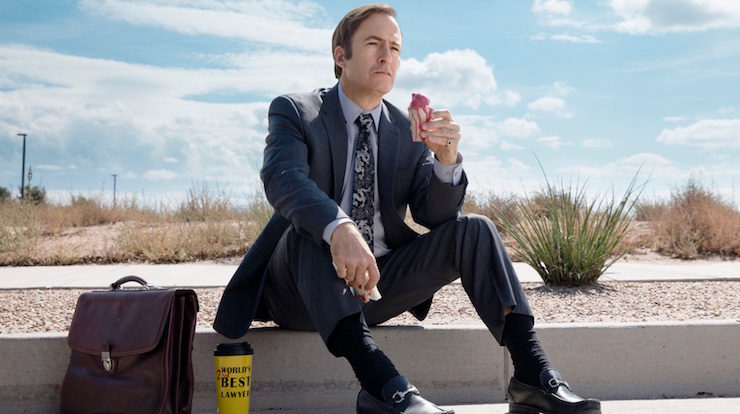
I loved Breaking Bad, but when they announced this spin-off series, I was skeptical; how would they make a prequel, hour-long drama centered around sleazy strip-mall lawyer work? Happily, the writers have more imagination that I do, and have turned out four seasons charting the heart-breaking saga of Jimmy McGill, the man destined to reinvent himself as Saul Goodman. A low-rent but talented lawyer with a con artist past, Jimmy struggles to find success but is thwarted time and again by those who don’t appreciate his more colorful approach to the law. Jimmy’s story dovetails occasionally with our old pal Mike Erhmentraut, brilliantly introduced in the pilot as Jimmy’s no-nonsense parking attendant nemesis. Mike takes on a few less-than-legal side jobs to support his daughter-in-law and grand-daughter and, well, things escalate pretty quickly from there. Actively rooting for Jimmy (and to a lesser extent, Mike) is easy, even though we know there’s no real happy ending in sight. Because the flash-forwards to life post-Breaking Bad? Oof. –Sarah
Miss Fisher’s Murder Mysteries
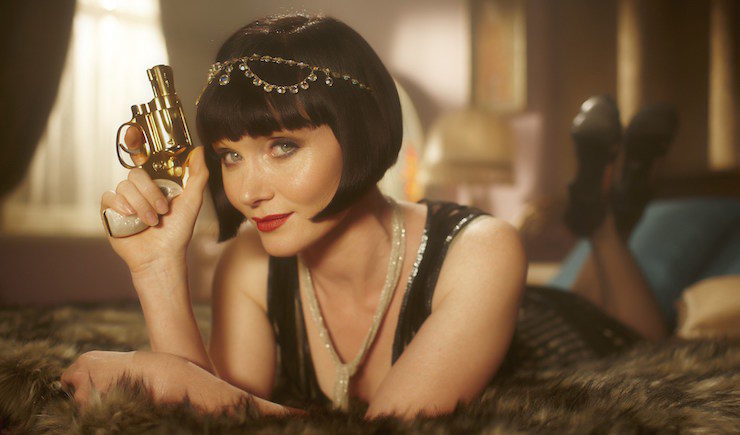
The show is different from the book series it’s based off of (written by Australian author Kerry Greenwood) in a lot of respects, but the point is really just “why don’t women get to be James Bond? They could be James Bond. But detective-style instead of spying. And they could have just as many affairs. And it could be set in the 1920s for maximum fashion goodness.” The series sadly ended a few years back, but you can find most of it on US Netflix, and they’re currently making a movie! Phryne Fisher is a very specific brand of wish fulfillment for a lot of women, and she’s surrounded by crew that really do embody the term “lovable misfits” (except for Aunt Prudence who is deeply entertaining for being played by Miriam Margoyles, but also grating for her deeply ingrained racism and classism). For a busy episodic show full of mystery, the characters actually develop at a steady and enjoyable pace, and you couldn’t find a more endearing group of actors anywhere. Some people enjoy the slow-burn romance between Miss Fisher and Detective Inspector Jack Robinson, while others don’t (I fall into the former camp), but it has to be said that those sorts of relationships rarely work out in television and somehow it pays off perfectly here. Will-they-or-won’t-they gets boring real fast, but with these two you’ve got the genuine question of whether or not Jack will let go of his own preconceived notions on relationships and get comfortable with Phryne being Phryne. If you’re into Agatha Christie and Arthur Conan Doyle with a bit more action, a female hero who actually has female friends, and a lot of fantastic hats, this is where it’s at. –Emily
On top of so many other things, this series depicts the most perfect UST in the form of Phryne and Jack eyeing each other over cocktails at the end of every single case. –Natalie
Pose
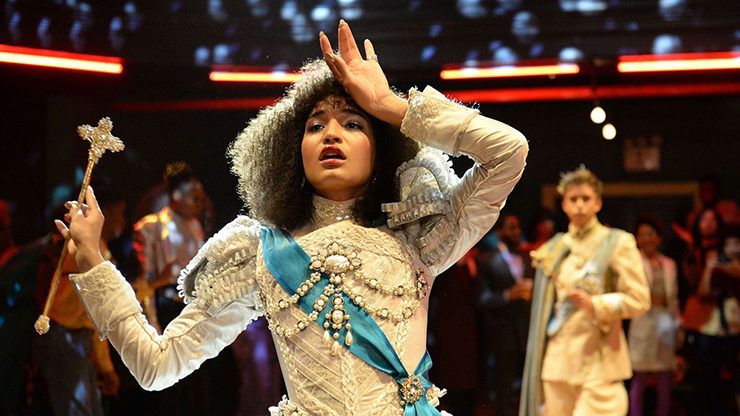
The thing about Pose is that the viewer goes into it laden with certain expectations, whether positive or negative, as is the case with any other new series. There are elements that seem a little off at first—the occasional clunky line delivery from a cast that features a mix of familiar faces and newer (in some cases, first-time, less polished) actors, the on-the-nose (but fun) musical cues, the heightened drama and emotional stakes, which can make some moments feel almost surreal, like the world’s most earnest soap opera unfolding on the gritty streets of late ‘80s NYC. But what makes the show extraordinary is that it teaches you how to question and discard your expectations, episode by episode, and embrace the experience of its characters on their own terms. The series focuses on a circle of young gay and transgender people of color connected by the city’s ballroom scene, but it’s so much more than a dramatization of the world documented in 1990’s Paris Is Burning. It has no time for cynicism or viewers’ ingrained expectations of the various limited, often tragic fates that await so many fictional LGBTQ+ characters. The show, like its protagonists, has so much heart, and stays true to its mission of celebrating the joys and triumphs of these lives without ever completely losing sight of the dangers and traumas of a community besieged by violence, abuse, and the constant struggles and fears being confronted at the height of the AIDS crisis.
Pose is a show about thriving, not just surviving, and how we build families, and communities, one act of kindness, one single show of strength or defiant act of resilience at a time. It’s a show I never knew I needed, and I’m so glad it exists—it’s joyous and wonderful and I honestly can’t recommend it enough. –Bridget
Bargain Mansions
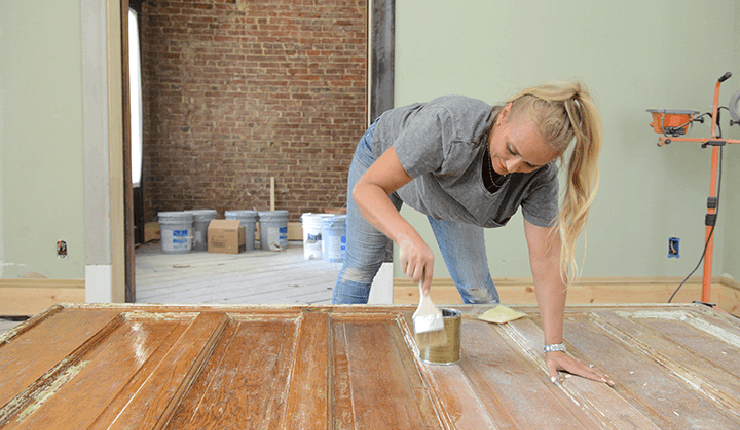
Last Christmas break, I fell down the home-reno-show rabbit hole, and let me tell you, it’s … a space. I read the takedowns. I love the McSweeney’s piece about Fixer Upper, a show I just cannot quit, even though it’s over. (The reruns are always the same! I can only watch Chip pretend to sing opera so many times!) I’m addicted to Maine Cabin Masters; I can binge Living Off the Grid and literally any show about tiny homes; and I’m anxiously awaiting season two of Bargain Mansions. Why this one? It’s hard to say. But there’s a down-home genuine enthusiasm to the way Tamara Day, her contractors, and her dad turn run-down, overly large Kansas homes into … well, tasteful but still giant homes that will look familiar if you’ve ever seen the “after” part on any home reno show. (To be fair, I could probably tell the difference between a Tamara Day house and a Joanna Gaines house. Should I have admitted that?) The closest I’m likely to come to actual home ownership is the time I’ve spent ogling houses on the other side of the country online, but I still like the particular comfort that comes from watching women tear down walls and speak confidently about wiring. –Molly
The Great British Baking Show / The Great British Bake Off
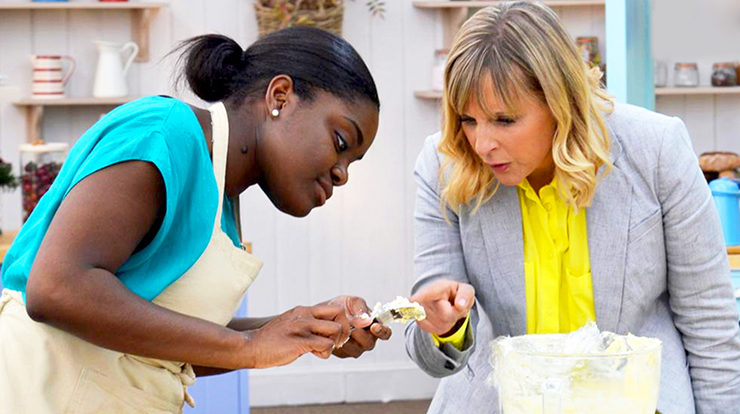
I have a weakness for even the most terrible cooking competitions, but the glory of this show is its refusal to play the standard reality show games—there are no drawn-out teasers, manufactured drama, or that blasted bowed cymbal sound effect. Just talented people humbly displaying their skills, and often proving themselves to be adorably nerdy in the process. –Sarah
Do you need to chill out? Had a long day? Want to look at beautiful foods? Enjoy competitions, but hate the nastiness reality TV often brings with it, and the misery it loves to linger on? Get yourself a cup of tea and settle in. –Emily










